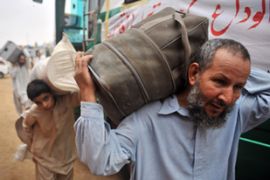Caught in the crossfire in Pakistan
Years of fighting have created “human rights-free zone” in northwest, Amnesty says.

Still, the report highlights the grim – and often overlooked – plight of civilians in the Fata. And it lays much of the blame on the Pakistani government’s strategy for dealing with the Taliban, which has oscillated between heavy-handed military offensives and ineffective peace agreements that cement the Taliban’s control.
One in eight fled
Those military campaigns – in the Swat valley, South Waziristan, and the Bajaur and Orakzai tribal agencies – created a massive displacement crisis in Pakistan in 2009.
The United Nations reported earlier this year that more than three million Pakistanis fled their homes in 2009 – or roughly one out of every eight people in northwest Pakistan.
Some of the internally displaced persons (IDPs) moved in with friends and family, sometimes forcing three or four families to share a single house.
Others lived in squalor in government-sponsored IDP camps.
“Amnesty International found consistent problems of poor sanitation and insufficient distribution of food and water [in the camps],” the report said.
While many IDPs have returned – roughly two million of them, according to the UN – they often go home to find their property destroyed and their communities insecure.
Widespread damage to infrastructure has not been repaired, and Taliban fighters pushed out by the fighting have slowly started to return as well.
The Frontier Corps, the paramilitary force responsible for security in the Fata, is “poorly equipped, poorly trained and poorly motivated”, Amnesty wrote. And government-backed militias called lashkars, far from bringing security to the population, often commit abuses of their own.
One such lashkar, in the Swat valley, killed six people alleged to be Taliban fighters and then burned down the houses of 20 people suspected of harbouring Taliban members.
Hiding among civilians
Taliban groups, which have continued to expand their control in northwest Pakistan over the last few years, have assassinated politicians – particularly members of the secular Awami National party – banned music, forced men to grow beards, destroyed hundreds of schools, and sharply curtailed women’s rights.
While some locals did initially welcome the Taliban’s presence – as an alternative to the Fata’s judicial system, widely viewed as corrupt and inefficient – the group quickly wore out its welcome.
“According to several locals interviewed by Amnesty International, Taliban norms soon felt more like a straitjacket on everyday freedoms than a security blanket from criminals,” the report said.
In addition to what Amnesty called the “violent imposition of social norms”, Taliban fighters were accused of frequently hiding amid the civilian population, particularly in schools and markets, which the Taliban often used to stage attacks on Pakistani soldiers.
One man in the village of Loi Sam, in Bajaur agency, said most of his family was killed when the Pakistani army shelled a market in a residential area where Taliban fighters were hiding.
“Two shells fell on his house, killing his father, mother, three daughters, two sons, two nephews as well as several neighbours,” Amnesty wrote.
Heavy fighting
The Taliban still maintains control of “substantial parts” of all seven tribal agencies in the Fata. Heavy fighting has done little to displace them, as demonstrated by the Pakistani army’s recent campaign in Orakzai agency.
The army announced the end of that offensive last week – but a shootout on Wednesday reportedly killed at least 50 people, including seven soldiers, and local media report that the Taliban remains strong in the agency.
Amnesty closed its report with a series of recommendations for the Pakistani government and the Taliban – urging them to protect civilians in combat zones, respect women’s rights and hold lashkars accountable, among others – and noted that the abuses fuel grievances against both parties, prolonging the conflict.
“They are wrongs in themselves, but … they have [also] fed a conflict that poses an acute danger to people in Pakistan, Afghanistan and beyond.”